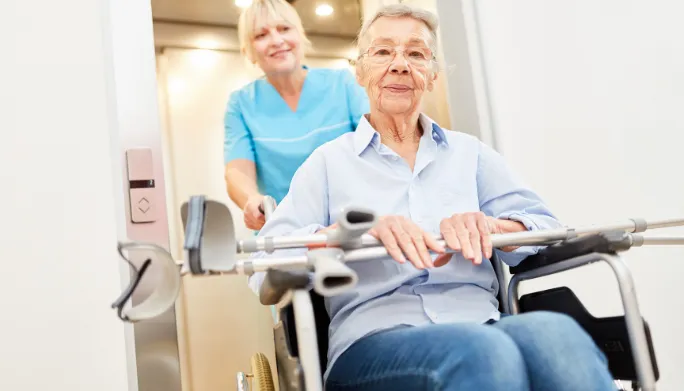Stroke in Fort Smith
Rebuild Strength and Independence After Stroke in Fort Smith
Over 800,000 individuals will endure a stroke this year. But recovery prognosis proves difficult amidst overwhelming new mobility challenges. Which therapy approach works best to rebuild skills like walking or communicating again? How rigorous should activity be or does excessive rest accelerate healing instead? At Therapists in Motion, our certified stroke rehabilitation therapists bring clarity to the recovery process by designing customized treatment plans aligned to each patient’s unique stroke-related deficits and realistic functional goals.
Specialized Neuro Recovery Care
Our compassionate therapists optimally trained to assess and treat stroke believe progress unfolds one small personal victory at a time. We deliver care intending to:
Maximize Safety and Comfort – Proactively prevent falls while establishing trust using achievable intervention intensities minimizing fatigue as skills gradually rebuild on patients’ own terms.
Restore Functional Mobility – Enhance coordination, strength and balance through repetitive task practice focused towards meaningful personal goals related to walking, dressing or grooming independence.
Common Post-Stroke Deficits We Address in Fort Smith
Depending on the location and extent of brain tissue damage, stroke may affect various functions in wide-ranging ways – even personality.
Our treatments target the most frequent impairments:
- Motor Weakness: Damaged upper motor neurons prevent muscle activation for mobility.
- Spasticity: Imbalanced signals to muscles cause abnormally increased tone and stiffness hindering movement control.
- Balance Challenges: Disordered sensory information reduces equilibrium ability increasing falls.
- Aphasia: Difficulty understanding/formulating speech resulting from injury to language processing centers.
- Apraxia: Inability executing learned purposeful movements like combing hair due to disrupted signaling between brain regions.
- Perceptual Changes: Impaired sensory processing and integration alter environmental awareness often causing safety concerns.
By pinpointing each patient’s precise deficits, we implement targeted therapeutic activities demonstrated to elicit neuroplastic changes optimizing post-stroke recovery potential over time for that deficit cluster.
Customized Therapy Facilitating Neuro Recovery
In contrast to rigid, universal rehabilitation protocols, our licensed physical and occupational therapists personalize progressive treatment plans tailored to patients’ distinct sensory, motor and language barriers.
We methodically build skills through repetition of adaptable activities focused on:
- Mobility Drills – Sit to stand, transitional movements reestablish step coordination for walking.
- Functional Rehabilitation – Reach and grip exercises hone grasping motions needed for feeding/dressing independence through external cueing strategies with specialized equipment.
- Balance and Postural Strategies – Supported perturbations in various positions recalibrate equilibrium reactions using fall prevention assistants.
- Oromotor Techniques – Neuromuscular education strengthens lips/tongue critical for improved speech clarity.
- Robotic-Assisted Training – Computerized simulations reinforce high-intensity task-specific patterns like stepping.
- Caregiver Training – Sharing home exercise program direction to bolster carryover between visits.
This adaptive training challenges patients regularly while aligning difficulty levels appropriately to each individual’s evolving capabilities for optimal development. Our constant positive reinforcement sustains motivation through long yet rewarding healing journeys.
Common Post-Stroke Rehab Questions Answered
What are the best treatment options following stroke?
Current guidelines strongly endorse initiating physical, occupational and speech therapy as early as safely feasible during stroke recovery for preventing learned non-use of dysfunctional areas and maximizing neuroplastic change potential underlying skill rebuilding through repetitive, rewarding practice of meaningful personal activities.
Which therapies do most post-stroke patients typically need?
Due to wide variability in capabilities following strokes, most patients benefit from interdisciplinary care from some combination of physical therapy addressing mobility/coordination deficits, occupational therapy improving areas like dressing/bathing function, and speech therapy focusing on swallowing ability and communication skills.
What helps facilitate optimal stroke recovery?
Adherence with customized therapeutic exercise/functional mobility training protocols aimed at personal goals, sufficient sleep and nutrients supporting tissue regeneration, adhering to medication schedules, consistently using mobility assistive equipment as needed and monitoring blood pressure facilitate best outcomes.
When does the brain tend to heal most following stroke?
Though timelines vary widely, research shows consistent engagement in physical rehabilitation procedures optimizing neuroplasticity early after acute medical crisis stabilization offers prime opportunity for recovering neuronal pathways and preventing maladaptive behaviors up to at least 6 months with slower gains still likely beyond a year.
About The Author
Danni Welch ignites movement in patients facing physical therapy and speech language pathology needs. Their commitment to delivering quality services helps unlock physical potential for a better quality of life. AtTherapists in Motion in Fort Smith, Danni Welch wields a patient-centered approach, with cutting-edge techniques to conquer a vast array of physical challenges.
With Compassion, Optimism Springs Eternal
If stroke abruptly altered your mobility, freedom, clarity of mind or communication abilities, take heart knowing the brain’s inherent plasticity stands ready for rewriting damaged connections when precisely activated through targeted, rewarding skill practice based on your unique deficit profile. Our passionate therapists equip you with customized exercise and mobility strategies promoting confidence, control and hope for pursuing a purposeful life. Small consistent daily victories in therapy redefine what’s possible adding up to huge transformations in functioning, outlook and independence.
Don’t settle for just coping or quiet resignation. Actively reclaim your potential! Let’s carefully assess lingering challenges then map out a restorative training plan aligned with your personal goals so life moves forward on your fulfilling terms.
Call Us For Stroke Rehab in Fort Smith
Ready to take back control over your mobility and rebuild independence? Call us to have one of our compassionate neurological rehabilitation specialists assess needs so we can begin designing your customized post-stroke exercise treatment plan catered to your unique circumstance and objectives.

